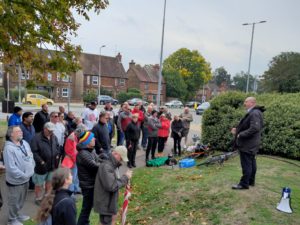CWU spearheading biggest strike surge this century – crucial period for UK working class
Postal October 1 2022
With five national Royal Mail Group strikes, four across BT Group and six Post Office walkouts so far, total days lost to strikes by CWU members are already over 700,000…
Industrial action by this union, along with walkouts by our fellow trade unionists in other under-pressure sectors, are quickly making 2022 the biggest year of strikes since the mass public-sector pension dispute of 2011. And, as strikers dig in for what is widely expected to be a long haul, it looks highly likely that that total will be surpassed within a few weeks.
This past week saw the resumption of CWU strikes, with Post Office members walking out on Wednesday and their Royal Mail colleagues returning to action on Friday and Saturday, when some 115,000 workers at around 1,400 workplaces covering every aspect of the nationwide operation came out on strike in their tens of thousands.
As well as strike action by our members, rail workers also took action in their long-running dispute over pay, contracts and passenger safety. And today also saw many joint rallies and events in various cities and towns of the UK. As is clear from today’s CWU social platforms, the pickets have been as lively and good-humoured as ever and the joint protests are growing, as unity across the working class builds. And the call of ‘Enough is Enough’ becomes ever louder.
CWU postal workers, already furious at the imposed 2 per cent pay deal, have been angered again by the further provocations of senior Royal Mail leaders, in particular the decision by CEO Simon Thompson to formally ‘give notice’ to the union of an intention to withdraw from several key national agreements. These agreements are not only vitally important to the protection of workers’ jobs, terms and conditions, they are also critical to the future of the company itself and the essential service it provides to the people of the UK.
Speaking from a picket line at Euston in north London, our general secretary Dave Ward reminded his interviewer and audience that those senior managers who today attack and wish to move away from those agreements and protocols are the very same individuals who negotiated them with the CWU and co-signed them into existence. In the case of the Pathway to Change agreement, this happened as recently as 2021. And this begs the question, if the company truly wanted to change Royal Mail in order to make it better and more successful, why would it walk away from the Pathway to Change agreement? It exists for that precise purpose.
As our general secretary went onto explain, the people running Royal Mail have no real intention of seeking to improve what the company does, or its services to the public. Its real intention is, “to turn Royal Mail into basically a parcel courier company like Hermes. That will mean the end of daily deliveries across the whole of the UK. And it will mean our members having to accept a levelling-down agenda.”
The workforce and its representatives, the CWU, are the ones who genuinely want to move the company forward, he continued, saying that, as well as defending the jobs, pay, terms and conditions of workers, the CWU also has “a better vision of the future, to make this company successful and to give the customers better services.”
And having easily demolished the company bosses’ false claims over change, he then took apart CEO Mr Thompson’s financial argument. Dave reminded people once again that Royal Mail had earlier this year announced record profits and that both the CEO and CFO had awarded themselves record bonuses on the basis of those profits. Therefore, if current claims that the company is losing a million pounds a day are true, then the senior leaders of the company deserve to be “sacked for “gross mismanagement.”
 While Dave was visiting picket lines in London, CWU outdoor secretary Mark Baulch toured several delivery units in the northern home counties yesterday, including Bedford, Luton and Stevenage, from where he reported: “There’s so much anger out there. Pay is massively important of course, but the company’s change agenda and them serving notice on a number of our agreements has really wound people up even more.”
While Dave was visiting picket lines in London, CWU outdoor secretary Mark Baulch toured several delivery units in the northern home counties yesterday, including Bedford, Luton and Stevenage, from where he reported: “There’s so much anger out there. Pay is massively important of course, but the company’s change agenda and them serving notice on a number of our agreements has really wound people up even more.”
Mark continued that, in deliveries, the action had been “solid everywhere I went and from reports I’ve received elsewhere, there’s been excellent support all around the UK – from top to bottom and everywhere in between.” Attitudes were hardening, he said, adding that “the lively humour and high spirits are as strong as ever, along with a steely and defiant determination.
“And I’ve found the same or similar attitude today as well. This morning, for example, I’ve been on the picket line in my own branch in East London – which also included a great rally in Whitechapel, where we were joined by speakers and support from a number of other trade unions involved in similar disputes. I’d describe the attitude and morale of our members as resolute, with people digging in for a long battle.
“Members are making it clear that they’ll do whatever it takes. Defeat is not an option and they’re absolutely rock-solid.”
 Davie Robertson, our CWU national officer for members in Royal Mail’s processing and distribution functions – as well as those working in Parcelforce – started yesterday at the South Midlands Mail Centre (SMMC) and National Distribution Centre (NDC) in Northampton, then heading onto Atherstone PSC in Warwickshire and to the largest Parcelforce unit, the Coventry Hub.
Davie Robertson, our CWU national officer for members in Royal Mail’s processing and distribution functions – as well as those working in Parcelforce – started yesterday at the South Midlands Mail Centre (SMMC) and National Distribution Centre (NDC) in Northampton, then heading onto Atherstone PSC in Warwickshire and to the largest Parcelforce unit, the Coventry Hub.
“It was absolutely torrential in the Midlands, but our members’ morale is strong and unshakable,” he said, adding that “people are very, very focused.”
But he had strong words of criticism for the senior leaders of Royal Mail, who are, he reported: “Spending a fortune trying to break this strike” adding that, at Atherstone, they’re bussing in large numbers of agency workers to do our striking members’ work. It’s a disgrace and our members are appalled at the actions of the company.
“But our members there are standing solid, steadfast and strong.”
Today, Davie has been at the Glasgow Mail Centre and Parcelforce depot, from where he told us that “it was still raining – but once again, the turnouts were great and the fighting spirit is there as always. We’re prepared for a long struggle and if that’s what it takes, then our members are up for it.”
- In 2011, 1.4 million working days were lost to industrial disputes, which was the highest total of the 21st Up to and including Saturday 1st October, CWU disputes alone have accounted for over 700,000 working days lost to industrial disputes in 2022.

